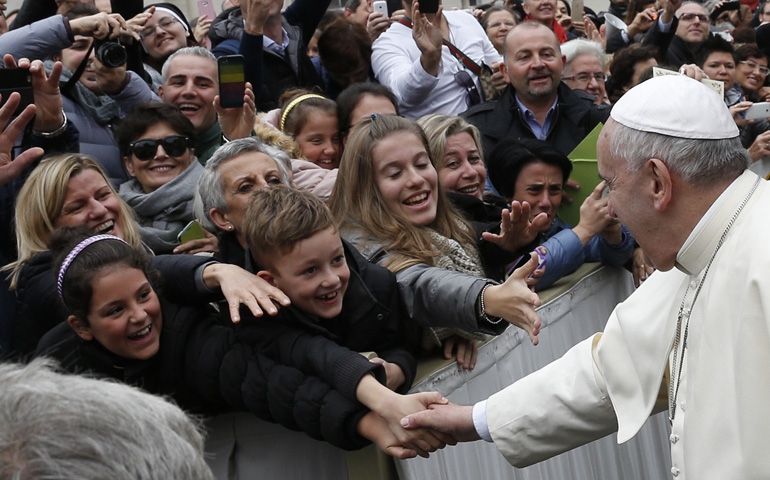The Pope at the service of peace
"Seek and strive after peace,” says a line in Psalm 34. This would have been a perfect episcopal motto for Pope Francis, had he not already taken, long ago, miserando atque eligendo, a clunky phrase that basically expresses his belief that it was only through God’s mercy that God chose him to be a bishop.
Jun 03, 2016

By Robert Mickens
"Seek and strive after peace,” says a line in Psalm 34. This would have been a perfect episcopal motto for Pope Francis, had he not already taken, long ago, miserando atque eligendo, a clunky phrase that basically expresses his belief that it was only through God’s mercy that God chose him to be a bishop.
Nonetheless, “seek and strive after peace” (inquire pacem, et persequere eam) could still be used as an unofficial motto for his pontificate.
If you step back and survey Francis’ first three years in office, you can see, through so many of his initiatives and actions, that he has tried to forge peace among broken families, bickering Catholic factions, divided Christians, folks of other religions and no religion at all, and even among rivalling world leaders and society figures.
But it is the manner in which he has tried to bring about peace in all these areas that is most striking and which marks a shift from the style of his most recent predecessor.
Pope Francis has sought, and pursued peace through encounter and dialogue.
The latest example came most recently when he held private talks with one of the world’s most important Muslim clerics — Sheikh Ahmed el-Tayeb, the first-ever Grand Imam of Egypt’s prestigious Al-Azhar Mosque and University, at the Vatican.
There was no such encounter and dialogue when Benedict XVI was pope. In fact, dialogue became a dirty word during his pontificate. The overarching concern was preaching and spreading the fullness of “truth,” which the former pope and his adoring retrodox disciples believed (or at least gave the very clear impression that they believed) could be found only in the Catholic Church.
Thus, the desire to engage in real dialogue — that is, really listening to another viewpoint — was considered as being weak, as selling out the truth. No matter the consequences, Benedict believed truth trumped all else. Including human lives. Including peace.
Even after he abdicated the papacy in 2013 and promised to live “hidden from the world” in self-imposed silence and prayer, he spoke out a year-and-a-half later to warn, again, that the truth — specifically, the missionary spreading of the Catholic faith — was endangered by calls to dialogue.
“Many today ask, inside and outside the Church… is the mission still relevant? Would it not be more appropriate between religions to meet in dialogue together and serve the cause of peace in the world?” he said, in an October 2014 talk that his private secretary, Archbishop Georg Gänswein, delivered for him at the Pontifical Urban University.
“The counter-question: can dialogue replace the mission? Today, in fact, many people have the idea that religions should respect each other and, in the dialogue between them, become a joint peacekeeping force… The question of truth, the one that originally moved the Christians more than anything else, here is put in parentheses,” he said.
“This renunciation of the truth seems realistic and helpful for peace between world religions. And yet, it is lethal to the faith.” That was Benedict’s conclusion.
Pope Francis does not “renounce” truth, but puts it in a context of relationships with God and with others.
And, yes, he does so for the sake of peace — between world religions and between all people in the world. --NCR







Total Comments:0